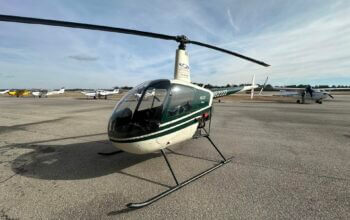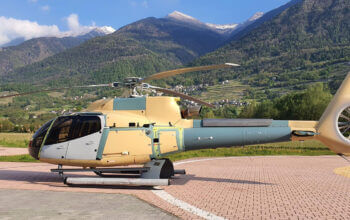Erik Sabiston was pilot-in-command of DUSTOFF 73 as it completed one of the most decorated operations in aviation history — three days of medevacs among heavy fighting in Afghanistan’s Watapur Valley in June 2011. Sabiston was awarded the Distinguished Flying Cross for his role in the 60-hour operation, which included 11 hoists, the evacuation of 14 wounded soldiers, the recovery of one soldier killed in action, and the completion of three critical resupply missions. Sabiston’s book about his experiences, Dustoff 7-3 — Saving Lives Under Fire in Afghanistan, was released on May 19.
Vertical 911: How did you get involved with medevac?
Erik Sabiston: I was an assault pilot and I was dutifully told to report to medevac. I didn’t want to do medevac — I actually hated the idea of it, quite frankly. I thought it was way too dangerous. But I learned to love it quickly.
V911: What changes do you need to make for the role?
E.S.: I think the biggest thing, coming from an aviation side, is how the crew pivots upon the medic, and that was a new experience. In addition, there was a greater awareness that the minimums we flew under were a little bit tighter than everybody else as far as weather and visibility. We would launch in weather that nobody else would launch in.
V911: One of the things you emphasize in the book is the importance of setting the right tone for the mission as pilot-in-command.
E.S.: That approach to crew management is key, and I learned it from my co-pilot. We called it the façade of calm; it was almost an exaggerated calmness in your tone. You would put on that standard “Airline Pilot Bob” type voice: “Ok, so now we’re taking a little bit of fire here.” And it was amazing how the crew would feed off it. In turn, it would eventually work its way back. You would start to feel calmer, too.
V911: What was the most challenging aspect of those missions in June 2011?
E.S.: I think being under fire. That first night, it was like a movie. There were rockets literally passing right in front of us when I was ingressing onto a hut where DUSTOFF 72 had just been shot. The rockets were in a steady stream less than 100 feet in front of my nose. They were obviously creating a curtain, and the curtain only pulled back long enough for us to slip our tail through. And then trying to put the Black Hawk on the hut’s roof. Our tail rotor was just a few feet on either side of two trees. The one wheel was on this roof that had mortar holes in it, and it was about to crumble. Meanwhile, they had us encircled in a 270-degree perimeter, with rockets firing, and then an RPG team suddenly appeared and took aim at us, but our Kiowas took them out before they had a chance to fire. I was no longer me for a little while on that mission. I really felt like I’d slipped into some really bad Vietnam movie.
V911: Did the recognition following the missions make you uncomfortable? Being called a hero?
E.S.: Very much. I can’t stand it. I’m not the hero. Every single thing that I’ve done, it’s stuff that happens all the time. With the book, I wanted people to believe that with a little bit of training, and no other options, that anybody reading this could do the same exact thing. The real heroes are the medics and the guys who actually go out on patrol.
V911: How did the book come about?
E.S.: I had kind of decided that I was going to come to Fort Rucker and forget about it, but when all the press came, it started drifting back into my mind. I had several authors approach me and a few people in the entertainment business. They talked about how they were going to tell the story — how they were going to change it. And it really upset me. I locked myself in a room in my office over Christmas break, about two years ago, and I wrote the whole book in a week. And it flew out — hundreds and hundreds of pages. Once I’d started, I couldn’t stop. It was kind of like I finally got it out and got it behind me.
V911: Seeing what you’ve seen — how do you cope with that?
E.S.: When you’re sitting there and, “Hey man — you’ve got some brain on your glove there…” That’s not a normal conversation you should be having, but sometimes you do have it quite regularly. How do you deal with it? For me, it’s a spiritual thing — it’s kind of like that quote from Stonewall Jackson, I think that my time is fixed and I can’t really be killed before it’s my time. So I don’t really worry about it. I know some people just bury it, but I think it’s important to get it out, talk about it, and move on.
V911: What have you got lined up now?
E.S.: I have book signings down here in Fort Rucker, and then I’d like to go up the East Coast and do some stuff there. But it’s difficult when you’re still in the military — I’ve still got a job! We’ll see what happens. You never know, maybe somebody will actually buy this book! I’m going to donate a portion of my proceeds to Fisher House Foundation — it’s really important to me to be able to give back to them.
This interview has been edited and condensed.










